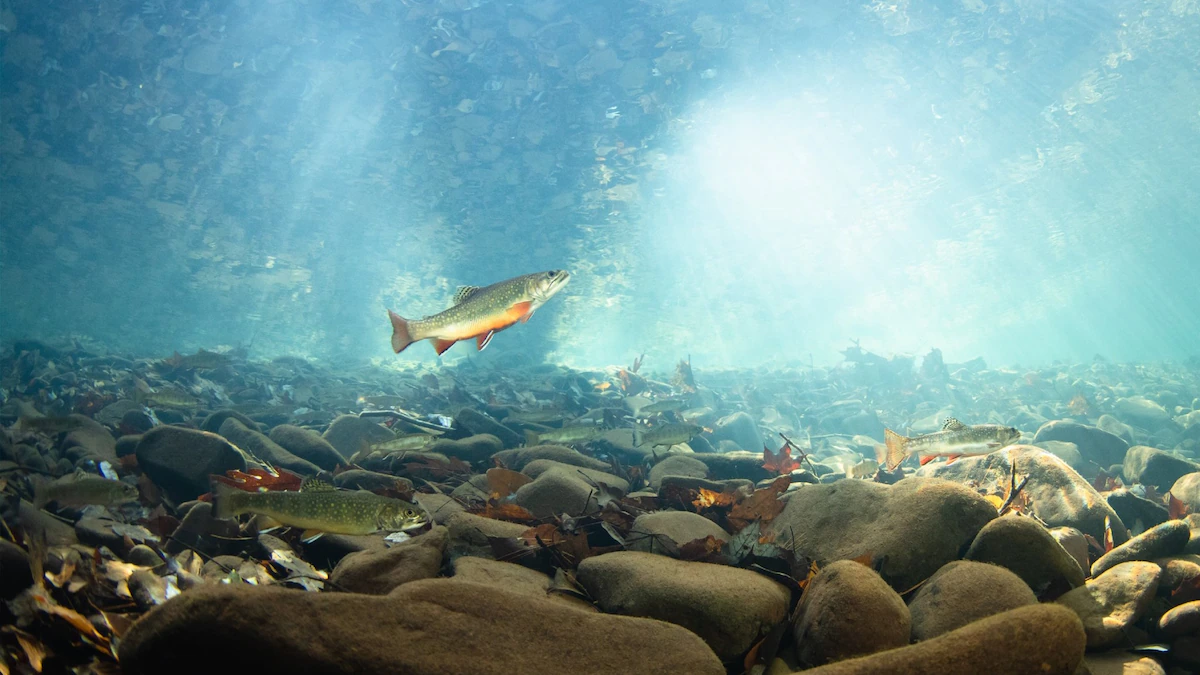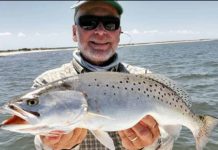Ian MacDonald / Sky-Hi News
As the owner and head guide of Winter Park Flyfishing, Jeff Ehlert has been experiencing the low flows and warm temperatures on Grand County rivers firsthand this summer.
Already, the fishing guide company has moved tours to the earliest morning hours and often has to cut trips short when river temperatures become too dangerous for fish. He’s been pushing clients to do four hours trips instead of eight.
“This is really tougher on our guides more than anyone because it’s cutting their paycheck way down,” Ehlert said. “July’s usually their biggest month.”
Now, Colorado Parks and Wildlife has asked anglers to voluntarily avoid fishing on the Colorado River between Kremmling and Rifle — and more voluntary closures could be coming.
The closure is in effect until further notice with a possibility of a mandatory emergency closure to all fishing if conditions worsen.
Heat, drought and low water levels are contributing to elevated water temperatures in much of Colorado, depleting oxygen levels and leaving trout vulnerable. Trout are cold-water fish that function best in 50-60 degree waters. When temperatures exceed 70 degrees, they often stop feeding and become more susceptible to disease.
As the aquatic biologist for CPW’s Hot Sulphur Springs office, Jon Ewert has seen already seen the local impact to the fishery firsthand. After a number of public reports of fish mortality along the Colorado River, he recently floated from Radium to Rancho del Rio to verify the issue. On that float, he counted 15 fish carcasses.
“It’s not like there are hundreds of dead fish around, but we are having a mortality event,” Ewert said. “There’s no question about that. If you go out on the river and look, you will find dead fish in certain sections.”
River flows have been exceptionally low this year.
The USGS gauge on the Colorado River at Catamount Bridge has been measuring 600-700 cfs, less than half what is historically expected there. The USGS gauge on the Colorado River near Dotsero is running at 1,250 cfs, down from an expected 3,000-4,000 cfs.
Mixed with high temperatures, these conditions spell disaster for the fishery. And it’s not just the Colorado River downstream from Kremmling.
Courtesy Trout Unlimited
According to Ewert, temperatures for other river sections in Grand are also edging toward dangerous levels for fish.
“People should be prepared for the idea that the Fraser and the Colorado all the way up to Granby — I don’t want to announce a voluntary closure before it happens, but they’re headed in that direction,” Ewert said.
Ewert explained that these types of voluntary closures on rivers are not unheard of, but the extent of the closures might be.
“We’re rapidly heading toward having more mileage of rivers under voluntary closure than I recall and maybe more than ever,” Ewert said.
To Kirk Klanke, president of the Colorado River Headwaters Chapter of Trout Unlimited, the voluntary closure of the Colorado River downstream from Kremmling is disheartening but necessary.
“We’ve been in a 20 year drought,” Klanke said. “This is the worst drought in all 20 years of drought. To protect the fishery, the closure has to take place.”
Yet it’s hard to ignore the impact this voluntary closure will have on some local outfitters in Grand.
“The other part of my reaction is, this really hurts an important industry in Grand County, which is fly fishing and fishing guides,” Klanke said.
For Ehlert, the issue highlights his frustration both with the extent of water diversion in Grand and Front Range water users that don’t seem to understand the extreme drought west of the Continental Divide.
“This should be a statewide problem,” Ehlert said.
One way that water temperatures can be helped is by releasing more into rivers from reservoirs.
Around 60% of Grand County’s water is diverted, mostly to the Front Range, with the Denver metro area receiving about 20% of its water from Grand.
In early June, temperatures were already spiking to 70 degrees on the Colorado River near Kremmling. Grand County coordinated with the Colorado River District, Denver Water, Northern Water and other partners to boost water levels where possible.
“While our primary responsibility is to make sure we’re supplying water to 1.5 million people in the metro area, we’re always looking for opportunities to help improve conditions on the rivers, to help the aquatic environment, recreation and communities they flow through,” said Nathan Elder, Denver Water’s manager of water supply, in a statement.
Denver Water estimated that by early July it will have voluntarily foregone collecting around 11,000 acre-feet of water from Grand County, roughly enough water to supply over 44,000 residences for one year.
Northern Water said it has bypassed more than 6,000 acre-feet or about 2 billion gallons of water this year that has been sent downstream in the Colorado River.
“This has been an extraordinary year on the Colorado River,” Northern Water Public Information Officer Jeff Stahla said. “We have answered the call from water managers in Grand County and further west and, in addition to what Denver Water’s doing, we’ve also bypassed potential diversions and let them go down the river.”
Representatives of the Grand County Learning By Doing Cooperative Effort, the partnership of Front Range and West Slope water stakeholders, said that coordination is underway to release additional flows to mitigate temperatures.
While these voluntary efforts by those with water rights in Grand are helping, the sharp contrast in water use is hard to ignore for those invested in the health of the county’s rivers.
“Here’s what really breaks my heart: The Front Range water diverters filled their reservoirs … they continued to divert as much water as they did in a wet year,” Klanke said. “They don’t seem to feel they have any more wiggle room to leave a little more water in the river …
“Now we’re at the mercy of senior water right calls downstream. As I watch my guide friends become unemployed, I watch Kentucky bluegrass be watered on the Front Range. It’s hard to swallow.”
Anglers should be aware that most of the major rivers on Colorado’s Western Slope are experiencing adverse conditions heading into the hottest days of summer.
CPW asks anglers to carefully consider the water and weather conditions when they go fishing for trout. If water seems too warm or fish appear lethargic, it would be best to leave the fish undisturbed. During mid-summer, try to fish early in the morning when the water is coolest.
Other suggestions include using heavier tippet and line to quickly reel in and release the fish, always wetting your hands before handling a fish, and keeping the fish submerged while unhooking and releasing it. Avoid taking the fish out of the water even for a quick photo in these conditions.
Until temperatures go down, anglers like Ehlert can’t do much except respect the requests from CPW.
“Pray for some rain and winter weather,” he added.
Credit: Source link































